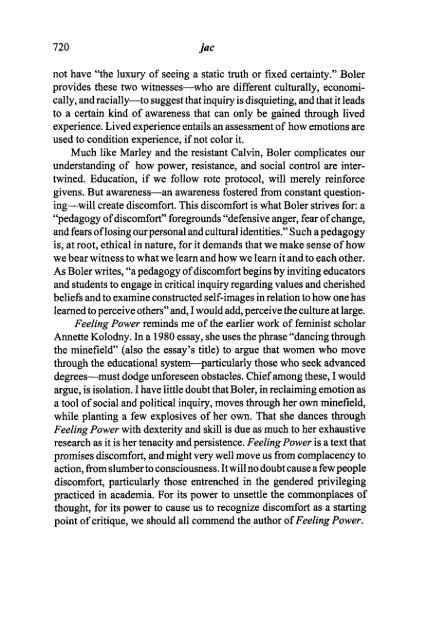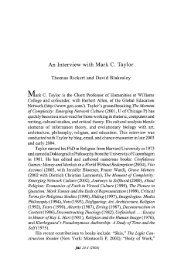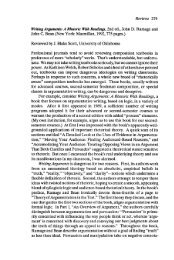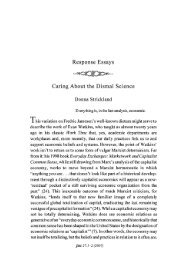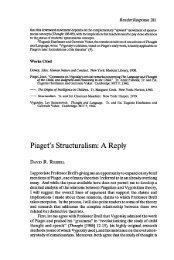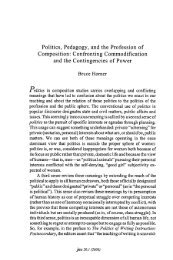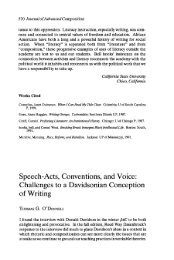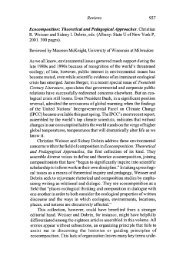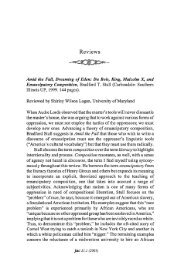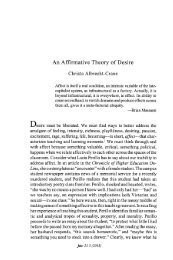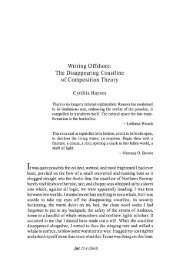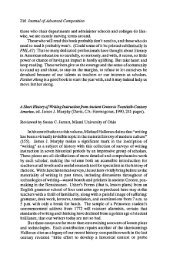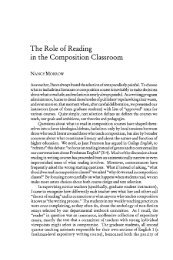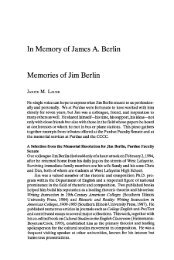Feeling Power: Emotions and Education by Megan Boler - JAC Online
Feeling Power: Emotions and Education by Megan Boler - JAC Online
Feeling Power: Emotions and Education by Megan Boler - JAC Online
Create successful ePaper yourself
Turn your PDF publications into a flip-book with our unique Google optimized e-Paper software.
720 jac<br />
not have "the luxury of seeing a static truth or fixed certainty." <strong>Boler</strong><br />
provides these two witnesses-who are different culturally, economically,<strong>and</strong>racially-to<br />
suggestthatinquiryisdisquieting,<strong>and</strong>that it leads<br />
to a certain kind of awareness that can only be gained through lived<br />
experience.Lived experienceentailsan assessmentof how emotionsare<br />
used to condition experience,if not color it.<br />
Much like Marley <strong>and</strong> the resistant Calvin, <strong>Boler</strong> complicates our<br />
underst<strong>and</strong>ing of how power, resistance, <strong>and</strong> social control are intertwined.<br />
<strong>Education</strong>, if we follow rote protocol, will merely reinforce<br />
givens. But awareness-an awareness fostered from constant questioning-will<br />
create discomfort.This discomfortis what <strong>Boler</strong> strives for: a<br />
"pedagogyof discomfort"foregrounds"defensiveanger,fearof change,<br />
<strong>and</strong> fearsof losingourpersonal<strong>and</strong>culturalidentities."Such apedagogy<br />
is, at root, ethical in nature, for it dem<strong>and</strong>s that we make sense of how<br />
we bear witness to what we learn <strong>and</strong> how we learn it <strong>and</strong> to each other.<br />
As <strong>Boler</strong>writes,"a pedagogyof discomfortbegins <strong>by</strong> invitingeducators<br />
<strong>and</strong> studentsto engage in criticalinquiryregardingvalues <strong>and</strong> cherished<br />
beliefs<strong>and</strong>to examineconstructedself-imagesinrelationto how onehas<br />
learnedtoperceiveothers"<strong>and</strong>,Iwouldadd,perceivethe cultureat large.<br />
<strong>Feeling</strong> <strong>Power</strong> reminds me of the earlier work of feminist scholar<br />
Annette Kolodny.In a 1980essay,sheuses the phrase "dancingthrough<br />
the minefield" (also the essay's title) to argue that women who move<br />
through the educationalsystem-particularly those who seek advanced<br />
degrees-must dodgeunforeseenobstacles.Chief amongthese, I would<br />
argue, is isolation.I have littledoubtthat<strong>Boler</strong>,in reclaimingemotionas<br />
a tool of social <strong>and</strong> political inquiry,moves through her own minefield,<br />
while planting a few explosives of her own. That she dances through<br />
<strong>Feeling</strong><strong>Power</strong> with dexterity <strong>and</strong> skill is due as much to her exhaustive<br />
research as it is her tenacity <strong>and</strong>persistence.<strong>Feeling</strong><strong>Power</strong>is a text that<br />
promisesdiscomfort,<strong>and</strong>mightvery well moveus fromcomplacencyto<br />
action,fromslumbertoconsciousness.Itwillnodoubtcauseafewpeople<br />
discomfort, particularly those entrenched in the gendered privileging<br />
practiced in academia. For its power to unsettle the commonplaces of<br />
thought, for its power to cause us to recognize discomfort as a starting<br />
point of critique, we should all commendthe author of <strong>Feeling</strong><strong>Power</strong>.


